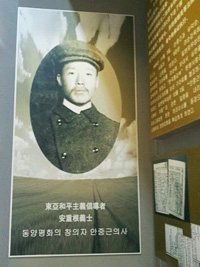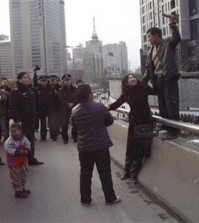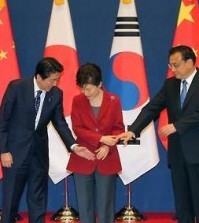- California Assembly OKs highest minimum wage in nation
- S. Korea unveils first graphic cigarette warnings
- US joins with South Korea, Japan in bid to deter North Korea
- LPGA golfer Chun In-gee finally back in action
- S. Korea won’t be top seed in final World Cup qualification round
- US men’s soccer misses 2nd straight Olympics
- US back on track in qualifying with 4-0 win over Guatemala
- High-intensity workout injuries spawn cottage industry
- CDC expands range of Zika mosquitoes into parts of Northeast
- Who knew? ‘The Walking Dead’ is helping families connect
Ahn Jung-geun hall worsens Seoul-Tokyo ties

A picture of Korean patriot Ahn Jung-geun hangs in a Memorial Hall, which opened Sunday to commemorate the late independence hero at the Harbin Railway Station in China.
(Yonhap)
By Chung Min-uck
A memorial hall built in China to honor Ahn Jung-geun, a Korean independence hero, is further worsening ties between Korea and Japan.
Infuriated by the construction, Japan’s chief cabinet secretary Yoshihide Suga labeled Ahn a “terrorist” on Monday.
Seoul condemned him for his comments in an unprecedentedly harsh tone.
“It’s astonishing that a person who speaks for the Japanese government has made such ignorant and anti-historical remarks,” said the Ministry of Foreign Affairs in a statement, describing Ahn an internationally-recognized hero who sacrificed himself for Korea’s independence and peace in Asia.
“Hirobumi Ito was the main culprit who masterminded imperial Japan’s plundering of the Korean Peninsula by force,” it said.
Ito was the first Japanese resident-general of Korea who forced a protectorate pact, or the Ulsa Treaty in 1905 which stripped Korea of its sovereignty. Ahn shot him dead in 1909 at a railway station in China’s northwestern city of Harbin. Ahn was sentenced to death the following year and Korea fell under Japan’s control from 1910 to 1945.
Suga, disappointed at China’s opening of a Memorial hall last week to honor the anti-Japan fighter, told reporters in Tokyo that Ahn Jung-geun was a “terrorist.”
He further said that Seoul and Beijing’s joint efforts in condemning Tokyo for its past acts greatly undermine regional security in Northeast Asia.
China earlier dismissed a diplomatic protest by Japan over its memorial to the revered Korean independence hero as unacceptable and renewed its calls for Japanese leaders to squarely face history.
China’s move is regarded as a countermeasure to the unrepentant attitude of Japanese politicians towards their nations’ past imperialism, underpinned by Japanese Prime Minister Shinzo Abe’s visit to the contentious Yasukuni Shrine last month.
The shrine honors 14 Class-A criminals of World War II (1939-45).
Since then Japan’s relations with Seoul and Beijing have plunged severely.
Reportedly, Korea and China have been in close cooperation to honor the revered Korean independence hero.
President Park Geun-hye initially asked her Chinese counterpart Xi Jinping to erect a monument at the site where Ahn Jung-geun was shot in Harbin during a summit meeting last June, according to reports.
But instead of a monument, Xi decided to build a memorial hall at Harbin station.
Critics argue that China’s move was aimed at weakening Seoul-Tokyo relations which serve as the key to Washington’s strategy of containing Beijing’s power in Northeast Asia.
The U.S. is an ally of both Korea and Japan but the neighboring Asian nations have yet to sign any military deal with one another.
Washington has, on numerous occasions, called for better relations between its two Asian allies.
Asked about the situation, a foreign ministry official said, Tuesday, “Although Korea and China closely cooperated in building a memorial hall for Ahn this doesn’t mean that the two countries share the same position on all history-related issues.”
The comments are interpreted as indicating that Seoul, regardless of its historical feud with Japan, is trying to maintain trilateral cooperation with Washington and Tokyo which serves as the cornerstone of Korea’s security.















